Biographical Information for Recent Advances in the Care of the Combat Amputee

Course Directors
 | RORY A. COOPER, PhD Contact Information |
Rory A. Cooper, PhD received the BS and MEng degrees in electrical engineering for California Polytechnic State University, San Luis Obispo in 1985 and 1986, respectively. He received the Ph.D. degree in electrical and computer engineering with a concentration in bioengineering from University of California at Santa Barbara in 1989. He is FISA & Paralyzed Veterans of America (PVA) Chair and Distinguished Professor of the Department of Rehabilitation Science and Technology, and professor of Bioengineering, Mechanical Engineering, Physical Medicine & Rehab, and Orthopedic Surgery at the University of Pittsburgh. Dr. Cooper is Founding Director and VA Senior Research Career Scientist of the VA Rehabilitation Research and Development Center of Excellence in Pittsburgh. He is also the Co-Director of the NSF Quality of Life Technology Engineering Research Center, a joint effort between the University of Pittsburgh and Carnegie Mellon University. He is the Editor of the journal Assistive Technology and the AT Research Book Series of IOS Press. Dr. Cooper serves or has served on the editorial boards of several prominent peer-reviewed journals in the fields of rehabilitation and bioengineering. He has received multiple prestigious awards to include the Olin Teague Award, Paul Magnuson Award, U.S. Army Outstanding Civilian Service Medal, James Peters Award, Maxwell J. Schleifer Award,DaVinci Lifetime Achievement Award, Veteran’s Leadership Program Veteran of the Year, and a member of the inaugural class of the Spinal Cord Injury Hall of Fame. Dr. Cooper has authored or co-authored over 200 peer-reviewed journal publications. He has ten patents awarded or pending. Dr. Cooper is the author of two books: Rehabilitation Engineering Applied to Mobility and Manipulation and Wheelchair Selection and Configuration, and co-editor of An Introduction to Rehabilitation Engineering, Care of the Combat Amputee, and the Warrior Transition Leader Medical Rehabilitation Handbook. Dr. Cooper is an elected Fellow of the Rehabilitation Engineering and Assistive Technology Society of North America (RESNA), the Institute of Electrical and Electronics Engineers (IEEE), the American Institute of Medical and Biological Engineering (AIMBE), and the Biomedical Engineering Society (BMES). Dr. Cooper has been an invited lecturer at many institutions around the world, for example the National Academies of Sciences Distinctive Voices Lecture, and was awarded Honorary Professor at The Hong Kong Polytechnic University and Xi’an Jiatong University. He has also been elected to Eta Kappa Nu, Tau Beta Pi, and Sigma Xi honorary societies. Dr. Cooper is a former President of RESNA, and a member of the RESNA/ANSI and ISO Wheelchair Standards Committees, and IEEE-EMBS Medical Device Standards Committee. In 1988, he was a bronze medalist in the Paralympic Games, Seoul, Republic of Korea. He was on the steering committee for the 1996 Paralympic Scientific Congress held in Atlanta, GA, and the Sports Scientist for the 2008 U.S. Paralympic Team in Beijing, China. In 2009, Dr. Cooper was featured on a Cheerios cereal box for his many achievements. He has been a member of the U.S. Centers for Medicare and Medicaid Services – Medicare Advisory Committee, Steering Committee of the Academy of PM&R on Research Capacity Building. and Chair of the National Advisory Board on Medical Rehabilitation Research, National Institute of Child Health & Human Development, and National Academy of Sciences Keck Foundation Initiative on Human Health Span Steering Committee. Dr. Cooper is a U.S. Army veteran with a spinal cord injury and a Director of the Paralyzed Veterans of America Research Foundation. He currently serves as a member of the U.S. Secretary of Veterans Affairs Prosthetics & Special Disability Programs Advisory Committee, U.S. Department of Defense Health Board Subcommittee on Amputation and Orthopedics, and the Board of Directors of Easter Seals. Dr. Cooper has actively collaborated with the Indian Spinal Injuries Centre on increasing access to quality services and devices for people with disabilities in India and throughout developing countries. | |
 | PAUL F. PASQUINA, MD Colonel (RET), U.S. Army Medical Corps Contact Information
|
Paul F. Pasquina, M.D. is the Residency Director and Chair, Physical Medicine & Rehabilitation and Director of the Center for Rehabilitation Sciences Research at Uniformed Services University of the Health Sciences, Walter Reed National Military Medical Center. Dr. Pasquina retired from the United States Army Medical Corps in 2012 as Chief of the Department of Orthopaedics and Rehabilitation at Walter Reed National Military Medical Center and the Director of the Center for Rehabilitation Sciences Research (CRSR) at the Uniformed Services University of the Health Sciences (USUHS). He is a graduate of the United States Military Academy at West Point and USUHS. In addition to being board certified in Physical Medicine & Rehabilitation (PM&R), he is also board certified in Electrodiagnostic Medicine and Pain Medicine. He completed a fellowship in sports medicine and remains interested in all aspects of musculoskeletal medicine especially as it applies to individuals with disabilities. He is the specialty consultant to the Army Surgeon General for Physical Medicine & Rehabilitation and a Secretarial appointee on the Department of Veterans Affairs (VA) Advisory Committee for Prosthetics and Special Disabilities Programs. Dr. Pasquina has authored multiple book chapters, journal articles and policy papers. He has served as the PM&R Residency Program Director and Medical Advisor to the North Atlantic Regional Medical Command for quality healthcare. He has received multiple military awards, as well as awards for teaching and mentorship, including the U.S. Army’s “A” Proficiency Designation for academic excellence, the Order of Military Medical Merit, and Honorary Fellow of the Rehabilitation Engineering and Assistive Technology Society of North America (RESNA). | |
Guest Faculty and Presenters
 | Dr. Douglas G. Smith Professor Emeritus Department of Orthopaedic Surgery, University of Washington |
Douglas G. Smith, MD is the Henry M. Jackson Foundation for the Advancement of Military Medicine’s Chief Orthopaedic Advisor for The Center for Rehabilitation Sciences Research. He is Professor Emeritus in the Department of Orthopaedic Surgery at the University of Washington, and Harborview Trauma Center in Seattle. He is also a Professor of Physical Medicine and Rehabilitation at the Uniformed Services University of the Health Sciences in Bethesda, Maryland. Dr. Smith received his undergraduate degree at the University of Notre Dame, and his medical degree at the University of Chicago. Dr. Smith served as the director of Prosthetics Research Study, a non-profit laboratory dedicated to advancing care for the amputee. He also served the Veterans Administration on their federal advisory committee for Amputations, Prosthetics and Special Disabilities; the VA merit review grant committee, and served as an associate editor for the VA’s Journal of Rehabilitation, Research and Development. He was on the Advisory Board for the US Military Amputee Care Program from 2001-2008. He has also recently participated on a training exercise for the US Navy Hospital Ship The Comfort. Dr. Smith was the lead editor of the 3rd Edition of the Atlas of Amputations and Limb Deficiencies – Surgical, Rehabilitation and Prosthetic Principles, Published by the American Academy of Orthopaedic Surgeons. He has authored or co-authored over 125 peer-review publications, 21 textbook chapters and 2 books. Dr. Smith served as the Medical Director for the Amputee Coalition of America (ACA) from 2000 to 2008. For the ACA, he published over 35 consumer articles on amputation surgery and rehabilitation, which are available for free at the ACA web site. Consumer publications such as the ACA’s InMotion Magazine provide a unique educational role for individuals with limb loss, for their families and for the general public. Dedicated to improving the quality of amputation surgery, he has taught for the AAOS at their instructional courses on amputation surgery, and through Prosthetics Research Study developed a free, just-in-time educational site for amputation surgery housed as a part of the UW - Department of Orthopaedics & Sports Medicine web based learning center. | |
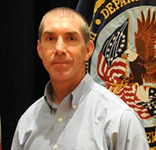 | Dr. Joseph Webster Associate Professor Department of Physical Medicine & Rehabilitation Virginia Commonwealth University |
Dr. Joseph Webster is a physician with over 20 years of experience in the field of Physical Medicine and Rehabilitation (PM&R) and in working with individuals with amputations. Dr. Webster is currently an Associate Professor in the Department of PM&R at Virginia Commonwealth University and a Staff Physician at the Hunter Holmes McGuire VA Medical Center in Richmond, Virginia. Dr. Webster has been serving as the National Director of the VA Amputation System of Care (ASoC) since 2011. Dr. Webster received his medical degree from the University of North Carolina and completed residency training in PM&R at the University of Washington. Dr. Webster is board certified by the American Board of Physical Medicine and Rehabilitation. | |
 | Dr. Jacqueline Moore Physical Therapist Comprehensive Combat and Complex Casualty Care Jacqueline.l.moore8.civ@mail.mil
|
Jacqueline L. Moore is an orthopedic board-certified physical therapist with the Naval Medical Center San Diego’s Comprehensive Combat and Complex Casualty Care (C5) Program. Jacque received her Master of Physical Therapy degree from the US Army-Baylor University Graduate Program in Physical Therapy at Fort Sam Houston, Texas, and served 12 years as an active duty Army Physical Therapist. Her last assignment brought her from Walter Reed Army Medical Center to the Naval Medical Center San Diego to assist in the development of the C5 Program, which provides multidisciplinary medical services to wounded, ill, and injured service members and other beneficiaries. Jacque has since received her Doctor of Science in Physical Therapy degree from University of Maryland-Baltimore School of Medicine. She is a certified Athletic Trainer, Certified Strength and Conditioning Specialist, and certified ASTYM provider. She is also a trainer for the Amputee Coalition’s Peer Visitor Certification program | |
 | Dr. Peter Rubin Chair of the Department of Plastic Surgery University of Pittsburgh |
J. Peter Rubin, MD is Chair of the Department of Plastic Surgery, the UPMC Endowed Professor of Plastic Surgery, Director of UPMC Wound Healing Services, and Professor of Bioengineering at the University of Pittsburgh. He earned his undergraduate degree in biology from Grinnell College and his M.D. degree from Tufts University School of Medicine. He completed a residency training program in general surgery at Boston University/Boston City Hospital. He took time away from the clinic to pursue a two-year fellowship in surgical basic science at Massachusetts General Hospital/Harvard Medical School. He completed a three-year residency in plastic surgery at Harvard Medical School and joined the plastic surgery faculty at the University of Pittsburgh. He is a core faculty member in the McGowan Institute of Regenerative Medicine (MIRM). Dr. Rubin is well recognized for his surgical skills and innovative solutions to complex reconstructive problems. In addition to his active clinical program, Dr. Rubin directs a basic science research program in the biology of adipose derived stem cells and serves as co-director of the Adipose Stem Cell Center at the University of Pittsburgh. He is the principal investigator in an NIH funded line of research aimed at developing cell based methods for clinical soft tissue reconstruction after cancer therapy. He directs a related line of research aimed at soft tissue reconstruction for injured military personnel as an investigator for the Department of Defense Armed Forces Institute for Regenerative Medicine (AFIRM). To facilitate the rapid translation of new technology, he founded the Center for Innovation in Restorative Medicine (CIRM) at the University of Pittsburgh. | |
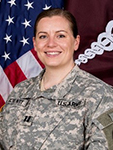 | Dr. Meghan McHenry Brook Army Medical Center |
Dr. Meghan McHenry is a native of West Babylon, NY who attained her bachelor’s degree in Psychology from Boston University. She went on to medical school at Jefferson Medical College in Philadelphia, PA and graduated with a Doctorate of Medicine. Dr. McHenry completed her transitional internship and residency in Physical Medicine & Rehabilitation (PM&R) at Walter Reed National Military Medical Center (WRNMMC). After residency she spent time as staff physiatrist in the Department of Pain Management at Brooke Army Medical Center (BAMC) and is currently serving there as the Chief, PM&R Service, Chief Complementary & Integrative Medicine Clinic, and the Medical Director of the Functional Restoration Program. | |
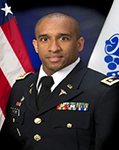 | Dr. David Reece Interventional Spine & Pain Physiatrist
|
Dr. David Reece is an Interventional Spine & Pain Physiatrist. He is an Osteopathic Physician (D.O.) with his primary Board certification in Physical Medicine & Rehabilitation (PM&R) with additional Board certifications in Interventional Pain, and Neuromuscular Electrodiagnostic Medicine. He completed is Internship, residency at WRNMMC, and Joint Pain Fellowship with WRNMMC, John’s Hopkins, and NIH. Dr. Reece is also certified in Medical Acupuncture. He is a Pain Specialist treating complex pain/neuromuscular disorders, acute and chronic musculoskeletal & sports injuries, traumatic brain and spinal cord injuries, headaches, and polytrauma amputee rehabilitation. Dr. Reece incorporates an expansive variety of fluoroscopically and ultrasound-guided interventional procedures, along with acupuncture, osteopathic manipulation, and other complimentary alternative medicine modalities into his comprehensive pain management strategy. He is primarily based out of WRNMMC where is the Associate Program Director for the PM&R Residency and serves as the Pain Specialist for the White House Medical Unit. | |
Maj. Kevan Spencer, DO Acting Chief, Physical Medicine & Rehabilitation, WRNMMC | |
Maj. Kevan Spencer was born in Pittsburgh, PA and attended Lake Erie College of Osteopathic Medicine. He completed his PM&R residency in 2010 at Walter Reed Army Medical Center. He has served as the Acting Service Chief of WRNMMC PM&R since September of 2016. | |
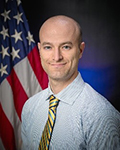 | Brad D. Hendershot, PhD Research Biomedical Engineer, WRNMMC |
Brad D. Hendershot, PhD is a Research Biomedical Engineer with the EACE, stationed at WRNMMC. In addition to this role, he directs activities within the Biomechanics and Virtual Reality Laboratories within the Department of Rehabilitation. Dr. Hendershot also holds an appointment, as Assistant Professor, within the Department of Rehabilitation Medicine at USUHS. He received his BS in Bioengineering from Penn State and PhD in Biomedical Engineering from Virginia Tech. Dr. Hendershot’s research is primarily focused on the mechanics and neuromuscular control of human movement, with a particular emphasis on the trunk/spine in both uninjured and patient populations. Recently, his research aims to characterize factors underlying the high prevalence of musculoskeletal complications secondary to extremity trauma, to mitigate development/recurrence over the longer term and ultimately improve quality of life for service members and veterans with limb loss. | |
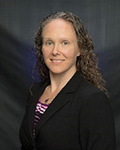 | Michelle J. Nordstrom, CTR, DHA Occupational Therapy, WRNMMC |
Michelle J. Nordstrom, CTR, DHA Occupational Therapist (OT) at Walter Reed National Military Medical Center (WRNMMC) in Bethesda, MD. Throughout her Military and Civilian career Michelle has been an advocate for the treatment and rehabilitation of physical and mental health injuries. She has co-authored book chapters describing OT’s role in Mental Health and has presented at national conferences such as American Occupational Therapy Association, Military Health Services Research Symposium and other research specific venues regarding her experience working with Mental Health, Complementary Alternative Medicine, and Osseointegraiton. | |
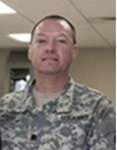 | Keith P. Myers, LTC Associate Professor in the Department of Rehabilitation
|
Keith P. Myers, LTC is an active duty LTC in the United States Army stationed at Walter Reed National Military Medical Center. He is the Deputy Chief of the Department of Rehabilitation as well as being the Amputee Clinic director. He is also an Associate Professor in the Department of Rehabilitation at The Uniformed Services University of Health Sciences and services as the Vice Chair of Education acting as a liaison between the department and the hospital. | |
Faculty Disclosure
All individuals in a position to control the content of this education activity including members of the planning committee, speakers, presenters, authors, and/or content reviewers have disclosed all relevant financial relationships with any entity producing, marketing, re-selling, or distributing health care goods or services, used on, or consumed by, patients.
The following relevant financial relationships were disclosed:
Dr. Douglas Smith: Grant Research: USUHS-Center for Rehabilitation Sciences Research Grants
Medical Advisory Board for AOPA ( American Orthotic & Prosthetic Assoc)
Dr. Peter Rubin: Grant Research: MTF
Consultant for Cohera, Sofregan
Stockholder: Strathspey-crown
No other planners, members of the planning committee, speakers, presenters, authors, content reviewers and/or anyone else in a position to control the content of this education activity have relevant financial relationships to disclose.
CME Accreditation and Designation Statement
This activity has been planned and implemented in accordance with the accreditation requirements and policies of the Accreditation Council for Continuing Medical Education (ACCME) through the joint providership of University of Pittsburgh School of Medicine and the Center for Rehabilitation Science Research at the Uniformed Services University for the Health Science. The University of Pittsburgh School of Medicine is accredited by the ACCME to provide continuing medical education for physicians.
The University Of Pittsburgh School Of Medicine designates this live activity for a maximum of 6.5 AMA PRA Category 1 Credits™. Physicians should claim only the credit commensurate with the extent of their participation in the activity.
Other health care professionals are awarded 0.6 continuing education units (CEU’s) which are equal to 6.5 contact hours.
Disclaimer Statement
The information presented at this
CME program represents the views and opinions of the individual presenters, and
does not constitute the opinion or endorsement of, or promotion by, the UPMC
Center for Continuing Education in the Health Sciences, UPMC / University of
Pittsburgh Medical Center or Affiliates and University of Pittsburgh School of
Medicine, the Uniformed Services University of the Health Sciences or the
Department of Defense. Reasonable
efforts have been taken intending for educational subject matter to be
presented in a balanced, unbiased fashion and in compliance with regulatory
requirements. However, each program attendee must always use his/her own
personal and professional judgment when considering further application of this
information, particularly as it may relate to patient diagnostic or treatment
decisions including, without limitation, FDA-approved uses and any off-label
uses.







